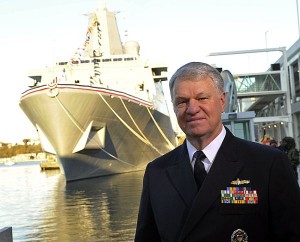We can point to the heartfelt speech CJCS Admiral Mullen just gave on military professionalism and the civil-military divide, and come away worried. Or, we can look at what CNO Admiral Roughead is doing over at Navy and feel a lot better about how things are going. As far as the civil-military divide goes, the Navy, under Roughead, is blazing the trail for the other services.
But let’s look at the problem first: Regarding the American people and the civil-military split, CJCS Mullen said this the other day:
And we cannot afford to be out of touch with them. And to the degree we are out of touch, I think it’s a very dangerous course, and that it will generate an outcome – someday, we’ll wake up one morning. It will be an event that will cause us to examine this. And in that, we will find out that yes, we are less than one percent, and yes, we’re living in fewer, fewer places, that we don’t know the American people. The American people don’t know us.
To remedy that, Admiral Mullen turned to the vets, upon whom he charged with a final mission, saying, they have to…
make sure that every single military member who joins us and then returns home, whenever that is and wherever home is, tells a good story. You want a recruiting – you want a recruiting command that – I mean, you would – if you wanted an approach and do away with recruiting, that’s the approach…
…So telling a good story about us, being a good story about us – we have a system without due – we have a system that just, when you serve, thank you for your service, and you
go back to your communities. And I just think that that’s a fundamental shift on how we need to be approaching who we are and how we move forward.
Anyway, that mission sounded awfully familiar. Why? Well, that’s what Admiral Roughead has been urging since 2008. As I wrote back then:
Hidden in a sort of boilerplate article on “naval diversity” and “don’t ask don’t tell” in the Virginian Pilot-Online, is news of a very, very good CNO initative:
Roughead wouldn’t wait until college to attract potential officers, however.
“We need to look younger,” the gray-haired admiral urged the audience, drawing a roar of laughs. Roughead chuckled, then rephrased the statement: “We really need to look at the younger demographic: middle schools.”
When students are applying to or visiting colleges, it might be too late to interest them in a military career, he warned.
The four-star admiral said he doesn’t envision recruiters canvassing middle schools. Rather, he wants ordinary sailors to tutor students, get involved in after-school or summer programs and talk about their experiences on submarines and ships.
“This is not a hard sell. This is not recruiting. This is simply sharing with young men and women what we do, what is possible and what the opportunities are,” Roughead said.
This is not recruiting. It’s called basic civics. It’s called making long-term allies. It’s called textbook diplomacy. To survive, the Navy desperately needs to make the institution come alive outside of the occasional mention in a dried up history class. Kids need to know more about the Navy than they do now.
For all the excitement over the perceived divide between the military and civilian society, the Navy is, of all the services, really, really far ahead of the rest in searching for ways to reach out beyond the cozy confines of the local superbase. Roughead has been doing a yeoman job in this regard–and he should be commended for really pushing (in a low-profile way) the Navy to become–for lack of a better term–civic-minded. He’s pushed initiatives to reach out, and, in turn, supported the infrastructure required to help the Navy learn about itself AND make itself relevant to the younger set. He brought history back into the Navy, re-invigorating the discipline and tying all the various naval history-oriented organizations under the broader rubric of the Naval Heritage and History command. All that got going under Roughead’s watch.
In my mind, It should be obligatory for naval personnel to learn the naval history of their home and make that maritime past come alive for kids in their community. (I proposed something similar in the conclusion of this paper back in 2007. Maybe it is too much, but it sure would be neat to have a Google Earth resource to display naval history–virtually by block–in some cities. It would be great if a schoolkid or a sailor wanted to find out how his or her town (or block, apt, what have you) contributed our nation’s naval heritage.
But, in short, I think the Navy, under Admiral Roughead’s leadership, is blazing a civic-minded trail for the other services to follow. We should all take note, and recognize Admiral Roughead, over the course of his tenure as CNO, done a lot of good. His work in tending the young and saving Navy heritage will, in time, pay big dividends.
Mark me: Far too many people underestimate this CNO, and, in the event he retires, we are going to miss him.

